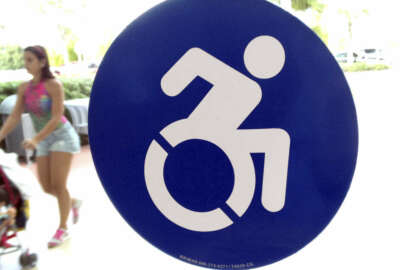
Suddenly disabled, this fed had his agency’s backing
Magic can happen when disabled but determined employees have an agency that want so support
Do employers exist primarily for the benefit of their employees, or for their customers?
It’s an absurd question. Dissatisfied, badly-treated, or grumpy employees aren’t going to serve an organization’s customers or constituents as well as possible. Taking care of employees is, at the least, a sound strategy for taking care of your customers. That’s in part why the Biden administration’s management agenda includes strengthening the federal workforce.
Good leaders and managers know there’s a big difference between simply complying with employment law and encouraging and nurturing a workforce. An interview airing this morning on the Federal Drive with Tom Temin illustrates the point. His story is especially relevant during Disability Pride Month.

Collin Walsh was fully-abled back in 2016, when he was attending orientation for candidates to become a Diplomatic Security special agent at the State Department.
“I was on my way to my dream job,” Walsh told me.
Then a strange disease with rapid onset rendered him paralyzed from the chest down.
“I was the most active guy,” Walsh said. “I was an active duty police officer. I was about to become a federal agent. I had traveled the world and then all of a sudden, I just I couldn’t move. Wow.”
He had to resign from the Foreign Service, embarking on Leave Without Pay for more than two years. Yet that arrangement left open a pathway back to the State Department.
Walsh said his U.S. doctors told him to forget about ever walking again.
“No matter who I talked to, my prognosis was permanent paralysis, I was never going to recover, I was only going to get worse,” he said.
Whereupon his wife, who is Indian, whisked him away to the care of her family in India. There, her extended family in effect forced him to fight his way back to walking. The effort lasted a year. The family didn’t have any special potions or treatments unknown to Western medicine. They simply held Walsh up and forced him to exert pressure on feet he could not feel.
“By the time I got back, I was on my two feet walking, still with trouble, I have issues, they’re visible, you could see them. But thankfully, I got much of my life back,” he said.
Let me tell you, this was one of those interviews — and I’ve probably interviewed 10,000 people — that reaches the heart.
Today, he can walk with elbow-supported sticks, and he uses a wheelchair only rarely, and only for extended distances.
And here’s the thing: Walsh is also back at the State Department Bureau of Diplomatic Security full time, as a foreign affairs officer. He’s a specialist in South and Central Asian affairs and international security. He’s on the way to becoming a foreign service officer, because he is once again physically capable of overseas travel.
“The Department of State, my employer, and especially the Bureau of Diplomatic Security, was wonderful with me,” Walsh said. “I had to leave for over two years in search for a cure and search for recovery. They allowed me to be on leave the entire time, despite the fact that I was only in their employ for three days.”
State also made the accommodations for Walsh’s disability when he did return — something legally required but often done reluctantly or grudgingly. Not in Walsh’s case. The bureau re-did the office Walsh uses, provided special chairs and other gear.
“That’s standard, but what my bureau did, and my request, went way above and beyond,” Walsh told me. He pushed the bureau farther and took on a kind of advocacy campaign. Now the entire 24-story building the bureau occupies in Rosslyn, Virginia has features such as automatic door openers, accessible restrooms, and elevators that don’t quickly snap shut on people who need a little extra time to step on in.
I asked Walsh if he feels ready physically and, frankly, mentally, for the rigors of overseas diplomatic work. Gotta love the answer on the “head” part of the question:
“I’m very headstrong, and I’m very happy to meet and overcome and triumph in the face of any challenge,” Walsh replied. As for the physical challenges that will never fully disappear? Here’s where an employer having your back comes through strongly.
“Physically, I do have issues,” Walsh said, “but by now I’m very well traveled throughout the bureaucracy, I know that the environment is right to ask for what is necessary. And I also have confidence in my department to make it happen because they’ve gone to great lengths to recruit folks like me with disabilities, both visible and invisible.”
Nearly Useless Factoid
The Earth experiences about 1,400,000,000 lightning strikes every year. That is around 44 strikes every second.
Source: U.K. Met Office
Copyright © 2025 Federal News Network. All rights reserved. This website is not intended for users located within the European Economic Area.
Tom Temin is host of the Federal Drive and has been providing insight on federal technology and management issues for more than 30 years.
Follow @tteminWFED
Related Stories




